She possesses one of the most priceless voices that Yugoslav music ever had, and has. Her life and worldview are the result of the precious upbringing that she received from her Yugoslav parents, a Bosnian father and a Slovenian mother. Yugoslavia was her homeland and emotional safe haven where she felt so good. She never chased money, but strived for a life of mental and spiritual wealth, because that’s the only wealth that makes a person truly diligent and eminent
When she was just a little girl, her singing tutor predicted that she would emulate the career of then famous opera singer Zinke Kunc, because she had such a wondrous voice that it was somehow natural for her to become an opera singer. That’s also what her mother and sister thought, but Bisera quickly fell in love with jazz and soul music and soon discovered American jazz singer Sarah Vaughn, who she never stopped loving and listening to. And it was all over for Verdi, Puccini and the rest. She had discovered music as love, as passion, as the only direction to determine her life.
“Music was, for me, a replacement for imagination; the notes carried me to a world of the most beautiful colours, to the blueness of the sea and the greenery of the grass. What I would give to be able to paint what I feel in music!”
She says that she was a poor pupil in school, in contrast to her older sister Senka, who was an excellent student who’d been exempted from taking the matriculation exam and completed her studies in economics. Bisera, in the meantime, was just looking to ensure she achieved a passing grade to advance to the next year.
“Since the time I first became aware of myself, only music existed for me. It still means everything to me today.”
The Veletanlić sisters inherited their talent from both parents.
“Both my mum and my dad sang beautifully. They sang Bosnian songs in the house, because my dad, Mehmed, who we nicknamed Meho, was originally from Bosnia, and they also sang Slovenian songs, because my mum, Rozalija, was originally Slovenian. We called her Rozika. I remembered how the four of us all sang my mother’s favourite song: ’A stone, another stone, turns in the water, only youth is mine, never to return.’”
Bisera is humorous, sometimes cynical in a refined way, and well intentioned, but she is above all an emotional person. You will struggle to coax her into talking about her own successes. And instead of her, it was one of her acquaintances from Belgrade who testified to me that, at the very beginning of her career, Bisera had sung in Germany, primarily in the clubs of American officers, where she wonderfully mastered her craft while working with exceptional musicians. One evening, that same Belgrader, who had been listening to Bisera and enjoying her song, was addressed by a black man, who said: “I hate her. I hate her because she sings and moves like a black woman!” And that was one of the greatest compliments she ever received.
Bisera has long been ranked among the best vocalists in the former Yugoslavia and across Europe. She’s also a distinctive individual whose career has been led by a choice of certain hit songs, setting high criteria for herself. Born in Zagreb, she grew up in Sarajevo and Sisak, then forged her career in Germany and Belgrade. That which she acquired in the home became enduring values.
Both my mum and my dad sang beautifully. They sang Bosnian songs in the house, because my dad, Mehmed, who was nicknamed Meho, was originally from Bosnia, and they also sang Slovenian songs, because my mum, Rozalija, was originally Slovenian
“The way I was raised in the home is also reflected in my life today. It was a classic upbringing that my parents instilled in me and my sister Senka. There are moments from our shared life that I will always remember: on Sundays, we all sat together at the table for lunch and to talk. My parents were pure people, and I mean pure on the inside, because it’s a given that they were clean on the outside. That was passed on to us and we thank them for that. Regardless of how much that doesn’t matter today, sounding dull and naïve to some, sometimes even ridiculous, I’m delighted that I was raised by such pure and honest people, and that I am the way I am. I’m a happy and wealthy person who had parents of differing religions who loved each other in Zagreb, had two daughters, and gave them wonderful names. I am proud of them and of the upbringing I received from them. No matter how difficult it has been to live in accordance with my own principles over recent decades, I haven’t abandoned that which represented my life and artistic choice. Fortunately, I have wonderful friends in Belgrade with whom I have great mutual understanding and with whom I share similar emotions.”
Just as she remembers Sunday lunches, so she also recalls summer holidays with her parents. And one holiday in particular:
“I went to the seaside with my mother, who took her pupils to Zaostrog [a Dalmatian resort town].
A seamstress made me a new bathing suit. In that same Zaostrog, at the same time, my sister was also having her summer holiday. On one occasion, my mother and I sat on the shore and watched Senka surrounded by friends, she was beautiful. The boys were teased her and at one point pushed her from the jetty into the water. I ran, leapt over the jetty and jumped in to save my sister, who actually knew how to swim. But I didn’t know how to swim. I slammed into the water like a stone, sank to the bottom and floated back to the surface. And that was how I learnt to swim.”
Her parents didn’t make announcements about what vocations they wanted their daughters to choose, though Bisera assumes that, like most other parents, they wanted their children to be doctors or something similar in the domain of secure professions. They didn’t remonstrate later, but at the time they weren’t exactly thrilled that both of their daughters had chosen to be singers. Bisera knew immediately after completing economics secondary school that she wouldn’t go on to study at university, because that would just mean wasting time when she was someone who had already chosen her life’s calling.
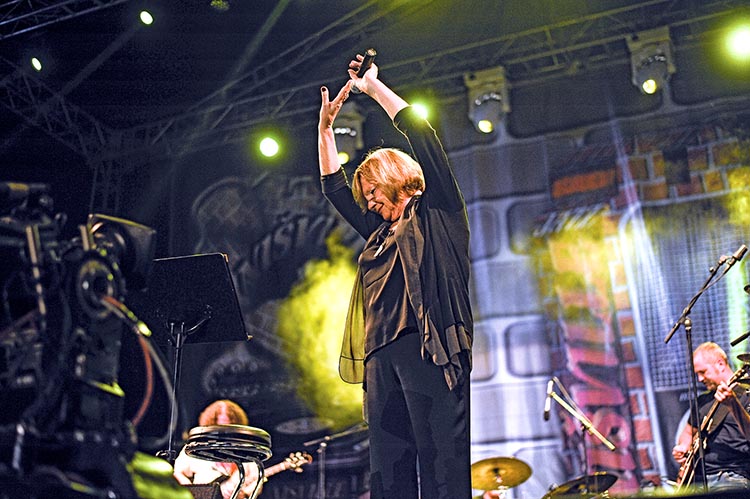
“I’m surprised I even completed school, given how much I used to skip classes. I would flee school, go to the banks of the river Kupa, play a small transistor radio that I got, blaring music, lying on the grass, with no one to see me… The whole world was mine!
“There was a popular radio show during those years called ‘Mikrofon je vaš’ [the microphone is yours], which provided talented young singers throughout the then Yugoslavia with a chance. When they arrived in Sisak, I signed up and sang, and choose nothing less than the Lullaby of Birdland [a jazz standard]. I was only capable of singing the chorus in English, but beyond that it was difficult to understand what I wanted to say. Listening to me was famous composer and conductor Miljenko Prohaska, who praised my musicality, but the language in which I’d sung was unclear to him!”
Despite her English then being ‘a little strange’, Bisera nonetheless won!
She opted for the more difficult path from the very start of her artistic career, belonging to a strong minority without whom top musical values would not have been created.
“I simply wasn’t interested in anything other than music. I was, and remain, a lover of sound, of music, and for me there was no pursuit of monetary wealth, trucks, houses… I wouldn’t have known what to do with all that. Of course, I have nothing against money, on the contrary, but I’m not one of those who will do anything to get money. While I remain alive, may things stay as they are today. For me to live with mental and spiritual wealth. That is the only wealth that makes a person truly diligent and eminent.”
The borders of Yugoslavia used to be illustratively described as extending from Triglav [the Slovenian mountain] to Đevđelija [the North Macedonian town of Gevgelija]. When Bisera became a measure of value in the domain of popular music from Triglav to Đevđelija, one TV Belgrade director wittily composed the success formula for every programme on domestic television, stating: “You must have Bisera, a cartoon and a BBC broadcast.”
Bisera was highly rated as a vocal soloist from the earliest days of her career, but not as much as she deserved. It was only after applying for a fourth time that she received the national recognition awarded when worthy artists become eligible for a state pension, with that additional monthly income popularly referred to as the national pension. She received a lifetime achievement award at the 2017 Nišville jazz festival in the Serbian city of Niš, while she’s also received two major awards over the last year: the lifetime achievement award of the Association of Jazz, Pop and Rock Musicians of Serbia, which was presented to her by jazz musician Jovan Maljković, the award’s previous laureate. Speaking at the time, he said that Bisera was the greatest singer he’d ever met.
No matter how difficult it has been to live in accordance with my own principles over recent decades, I haven’t abandoned that which represented my life and artistic choice
The second recent accolade is the Special Award of the Ilija M. Kolarac Endowment for her enduring contribution to the musical life of Belgrade. She received the award from new director of Kolarac Aleksandar Peković, who noted that Bisera is an outstanding artist who has had an extraordinary and lengthy career and has done a lot for the city and country with her music, especially for the temple of music and art that is Kolarac.
“I didn’t receive anything for 20 years, then I got two awards in one year. And I got scared. I thought about how they might be expecting me to depart soon, so they did something nice for me. These kinds of accolades would have meant much more to me if I had received them when I was at the peak of my career, when there was no end to my creativity. That would then have served as proof that my time and work were valued. No matter how much a lot of people didn’t understand what I was doing, they nonetheless felt what I wanted to say. But awards were lacking when I really deserved them.”
Bisera’s concerts and music tours are for musical gourmets, for connoisseurs, and they are worth remembering. She first learnt her craft in Germany and made three guest appearances in the countries of the former USSR, where singers from Yugoslavia would go to earn money, but in order to do so they would also try to butter up the audience to the max by singing songs that were originally in English or Serbian in the Russian language. However, Bisera didn’t butter up the audiences.
“I sang for them what I would ordinarily sing; I sang English, sang songs by Elton John and domestic compositions. And I went down exceptionally well.”
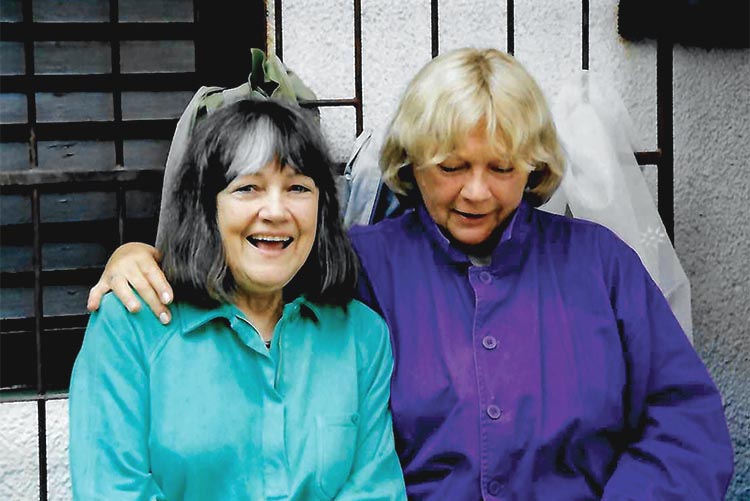
Still, a special illustration of her emotional charge was provided by the 2007 concerts that were held in honour of formerly very popular and beloved Yugoslav rock band Indexi. Those concerts were first held in Sarajevo and Zagreb, then in Novi Sad and Belgrade. Just remembering that time presents the danger that her blood pressure will spike and her eyes will water.
“After the war, that 2007 was the first time that I found myself in Sarajevo again. I arrived with terrible jitters, with images from 20 years earlier combining, emotions, scenes from the ‘90s passing through my head, I encountered some people who I hadn’t seen for such a long time. Accompanied by Bata Kovač on the piano, on the bass was Fadil, who had been in Indexi, and I sang Jutro će promijeniti sve [Morning Will Change Everything], which was a favourite song that was originally sung by Davorin Popović. While we were rehearsing that day for the evening’s concert at Zetra [an arena in Sarajevo], the music of Indexi was playing constantly. At one point, all of us, as many as there were of us, all hugged and started crying because we were hurting to heaven. And Davorin was looking down on us from heaven and his voice resounded. When the time came for me to head out on stage that evening, I filled myself up with all the necessary pills – for pressure, for nerves, for the heart… I appeared, bowed to the audience, and a shriek arose. I didn’t raise my head, keeping it bowed to the floor, because I felt myself starting to cry. And I start swearing at myself in the ghastliest way, to calm myself, and the applause didn’t stop. I somehow pull myself together and start singing. And when I sang, chaos erupted.”
With Vasil on stage, my blood cells work, I enjoy myself with him and his band. They are talented, educated, hardworking and I say they are gentlemen musicians
The Belgrade audience also presented a great sense of trepidation for Bisera for many years. She’d previously never had a solo concert in the city where she spent most of her life, and she especially had never performed at the Sava Centre, as she did that evening when she sang in honour of Indexi. And it ended up better than she could have even imagined. The audience gave her a standing ovation that seemed to never end. It was then that composer Kornelija Bata Kovač, who represented the integral spirit of Indexi, testified to me that, of all the concerts on that unforgettable tour, Bisera gave her best performance at that Sava Centre concert.
Today, less than a year after the death of this composer who left Bisera with some of her most beautiful and popular songs – Milo moje, Zlatni dan [My Dear, Golden Day] – Bisera can’t hold back the tears at the very mention of Bata Kovač’s name.
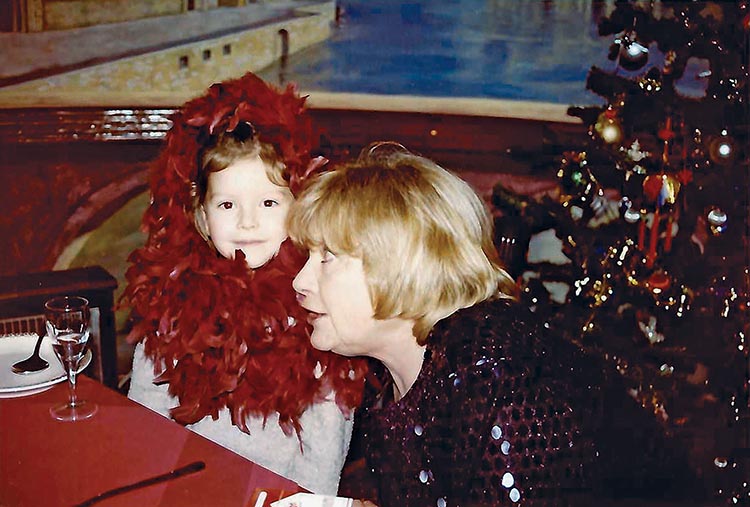
“It was tough for me to get over his parting. Very tough. He was a beautiful being. People like Bata are inimitable. Everything I would say about him is insufficient. I loved him like a brother, and he loved me, he was married to his wonderful wife Snežana, who pampered and looked after him like a baby. Unfortunately, he is no longer with us, and I will sing his songs for as long as I continue singing.”
Bisera also appeared as an actress in famous TV series Grlom u jagode [The Unpicked Strawberries]. Director Srđan Karanović had imagined her specifically playing the role of the girl with whom the main character, Bane Bumbar, would lose his virginity! And later again, when shooting the film Sjaj u očima [Loving Glances], precisely twenty years ago, Karanović invited Bisera to sing the film’s title composition and to act in one episode, as charmingly as only she can.
People forget about you even when you live here, and especially if you don’t. When you reach an age at which you’re less active, they simply strike you off. But that’s who we are: we aren’t capable of appreciating what we have, or of cultivating values
“The reason this exceptional Điđa film didn’t go down as well as it deserved among audiences was due to the fact that it is so beautiful, humane, tender, so pleasant and made with such high art, devoid of swear words and cheap stunts and gags. That film is a precise illustration of what I’ve said about the music that I love and that I don’t abandon.”
Her concerts over the last twenty years would have been unimaginable without the accompaniment of her nephew, composer and pianist Vasil Hadžimanov, and his band.
“He is my nephew without whom everything would be empty. When I say empty, I mean my singing accompanied by someone else who would be correct, but that wouldn’t be “it”. With Vasil on stage, my blood cells work, I enjoy myself with him and his band. They are talented, educated, hardworking and I say they are gentlemen musicians. Vasil will have a Kolarac concert with the RTS big band in June.”
There was a spot in Belgrade during the 1990s called ‘Plato’ [Plateau], in the area between the Faculty of Philosophy and the Faculty of Philology, where audience would come to listen to Bisera and Vasil’s band. Those were evenings that were awaited eagerly, with all spots filled, tickets having sold out in advance.
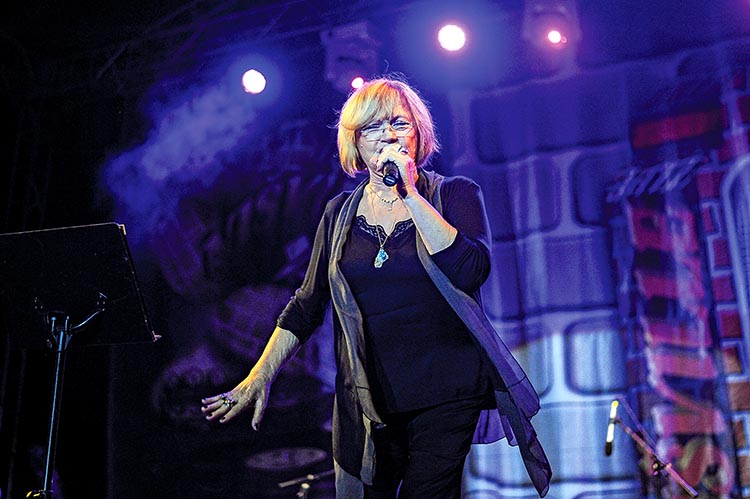
“There’s that slogan that something is attractive to audiences from the ages of seven to seventy-seven. Those evenings at the Plateau were intended for audiences aged from seven to ninety-seven. Every time when I would sing, some young people would come and beg me to go to the foyer of the college so that they could show me how they sing; for me to listen to them and tell them what to do. During the concert’s break, they would approach my table and overwhelm me with questions. They wanted to talk about music. I also recall some young female professors from the faculty also came, and we would socialise and chat. That was the dark ‘90s and yet we somehow held ourselves together, actually we were held together by the music.”
It is interesting to listen to Bisera talking about the world music scene, when she, for instance, describes the greatness of Stevie Wonder or so wisely interprets how Madonna gained worldwide fame.
“She is an example of someone who had had a wondrous career and didn’t deserve it. I knew she was a bad singer, but I only realised how bad a singer she really is after the Wembley concert where she sang live with Sting and the backing vocalists accompanying her. She really didn’t know where she was or what she was singing, and these people were playing and singing, masterfully of course, which only served to emphasise her ignorance even more. But I take my hat off to her for creating an institution out of nothing. She is proof that, in this business, when you’re capable, you don’t even need to know how.”
It was tough for me to get over the parting of Bata Kovač. Very tough. He was a beautiful being. People like Bata are inimitable. Everything I would say about him is insufficient. I loved him like a brother, and he loved me
Bisera has spent her entire life avoiding public places and scandals of any kind. She has only spoken to the media when she’s had a good professional reason to do so. She jokingly calls herself a free and prominent artist without a job.
Many people, even journalists, thought for years that she was somewhere else in the world; that she no longer lived here.
“People forget about you even when you live here, and especially if you don’t. When you reach an age at which you’re less active, they simply strike you off. I read how they wrote about great jazz musician Duško Gojković. I knew him personally and worked with him. He was a big name in the world of music, he performed with the best, but nobody cared about that while he was alive, and he didn’t live here but rather in Germany. Now that he has left this world, they write about him and seem to marvel in wonder at his biography. As if they are wondering whether it was really true. But that’s who we are: we aren’t capable of appreciating what we have, or of cultivating values.”
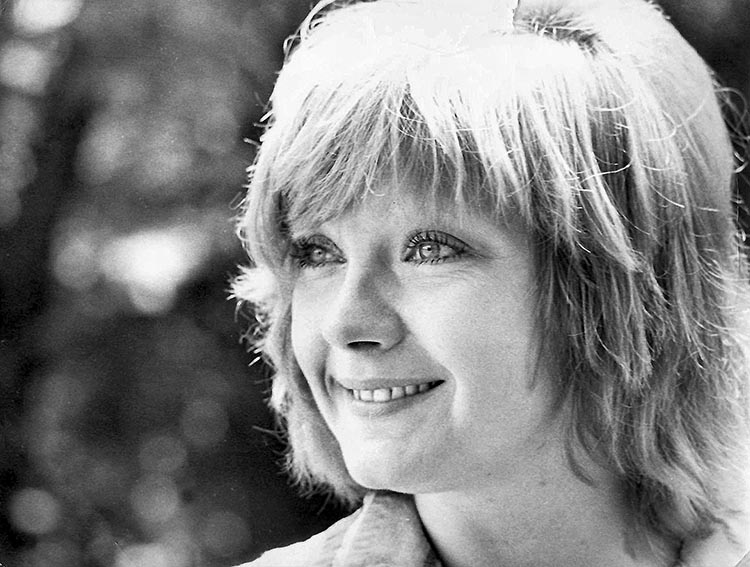
With an awareness of how uncertain a stake in life emotions are, Bisera doesn’t abandon hers, because they are the most secure link that she has with the music to which she has become attached. She shows them with her family and close friends, and once also showed emotions towards an unknown man, as was the case with assassinated Prime Minister Zoran Đinđić:
“I was invited to sing at some ceremony when he was already prime minister. We said our farewells and I gave him a big hug because I felt like he was one of my own. That was my only closer encounter with politics, with a politician. Zoran Đinđić was unique and special.”
Apart from music, Bisera has had another affinity for the past few decades: painting. She has had several solo exhibitions, and her paintings have been reviewed by writer and translator Silvija Monros Stojaković, who wrote: “Bisera is the only one who still endures from the bygone times of the pioneers of local music that is neither literally folk music nor the subsequent sociological phenomenon of turbo-folk. She is an original artist who is consistent to herself. That, among other things, is why she sometimes doesn’t sing… Periods without singing can sometimes last an eternity with this resplendent and enduring artist of ours, meaning she also resists…And when she can’t pour her colours into a song, Bisera will grab a canvas.”
Whatever she turns her hand to, Bisera turns it into a work of art. Just as her name is of Arabic origin, she is a synonym for something that’s the brightest, the most precious, the most beautiful.